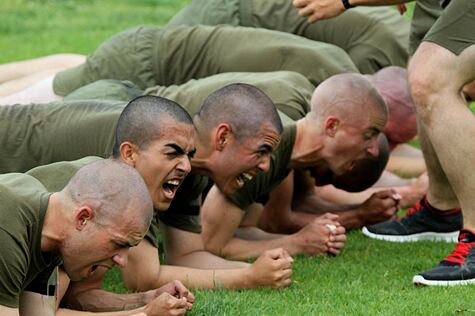The top Marine’s decision to authorize planks on the Corps’ annual fitness test may have been born out of a visit he made to a 3d Raider Battalion training facility in May 2018.
During the visit to the commando unit at Camp Lejeune, North Carolina, Gen. Robert B. Neller was briefed by human performance specialists on the high rate of lower back pain across the base. Staff told Neller the issue could be prevented with a better core stabilization exercise.
According to a white paper sent to Neller, and obtained by Marine Corps Times, lower back pain was the “leading” musculoskeletal diagnosis “treated by all physical therapy and sports medicine clinics across Camp Lejeune” between June 2017 and June 2018.
The paper, which included details of Neller’s visit and a preliminary study on planks, was written following Neller’s discussions with staff at the Raider human performance center.
Emilie Schmidt, a physical therapist with 3d Raider Battalion, recommended to the commandant that the Corps swap out crunches for the plank on the PFT, as evidence showed that the crunch was contributing to lower back pain.
RELATED

“An undisputable contributing factor to LBP [ lower back pain] is poor “core” stabilization," which can be prevented or rehabilitated by “proper core conditioning,” according to the paper.
The crunch has been “ineffective at assessing functional core strength” and “arguably detrimental for back health,” according to the paper.
“In addition, crunch-type exercises have been shown to be contrary to proper core development, and in fact, have been demonstrated to decrease overall force production capability of the arms and legs when the body is placed in spinal flexion," the paper reads.
“Therefore, the current PFT crunch test is not only ineffective at measuring true ‘core’ stability, endurance, or strength, it is likely contributing to the high incidence of LBP encountered in our rehabilitation clinics,” the paper stated.
Staff at the Raider center conducted a preliminary study on planks and crunches that involved 240 Marines from 3d Raider and the Staff Noncommissioned Officer Academy aboard Camp Lejeune.
According to the white paper, 91 percent achieved a perfect score on the crunch portion of the PFT. But, for the plank, only 13 percent achieved a max hold of 180 seconds, while 12 percent failed the test by holding the plank for less than 60 seconds.
“This is a drastic difference compared to the 13% on the plank-hold assessment, supporting the argument that the crunch fails to accurately measure core strength,” the paper reads.
The Marine Corps first publicly announced it was researching planks as an alternative to crunches at the December 2018 meeting of the Defense Advisory Committee on Women in the Services. The Corps’ Force Fitness Division carried out its own testing and research into planks.
Come Jan. 1, 2020, Marines will have the option of planks or crunches. But for a max score, Marines will need to hold a plank for four minutes and 20 seconds, not 180 seconds as used in the 3d Raider study.
The score and time chart for the plank was recently published in an administrative message on June 7. According to the scoring rubric, the minimum plank hold time is 1 minute and 3 seconds, which will net a Marine forty points out of 100 point scale.
An instructional video on how to perform and score the plank will be posted to the Force Fitness Division’s website no later than Sept. 1, 2019, according to the Marine message.
Shawn Snow is the senior reporter for Marine Corps Times and a Marine Corps veteran.





